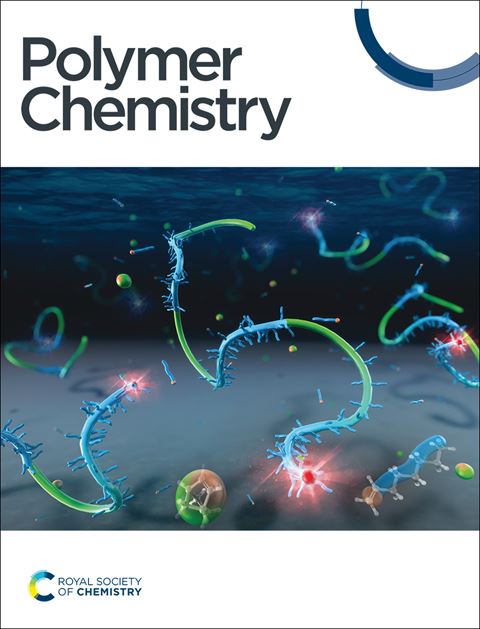Expanding the chemical functionality of levoglucosenone-based monomers for degradable thiol-ene thermosets with high bio-derived content
IF 4.1
2区 化学
Q2 POLYMER SCIENCE
引用次数: 0
Abstract
Levoglucosenol, the reduced form of levoglucosenone (LGO), was utilized in this work to synthesize seven novel monomers bearing both pendant alkene functional groups and the inherent internal double bond of the bicyclic LGO structure. Monomers possessing ester, carbonate and carbamate linkers were prepared with a specific focus on developing compounds with a high fraction of bio-derived carbon, which was achieved using fatty acids (oleic and linoleic acid) and plant-based acids (citronellic and 10-undecenoic acid). The monomers were cured via ultraviolet (UV)-initiated radical thiol-ene “click” chemistry with commercially available multifunctional thiols generating optically transparent cross-linked thermosets in typically less than 60 seconds, and which possessed tuneable thermal and mechanical properties. Thermogravimetric analysis revealed that most polymers were stable up to 300 °C, with glass transition temperatures ranging from 0.3 to 37.4 °C and tensile strength values varying from 0.5 to 54.0 MPa, depending on the nature of the structure of the LGO-based monomer. The hydrolytic degradation of these thermosets via ester hydrolysis was demonstrated in an alkaline medium, the rate of which could be controlled by the length of the monomer side chain and nature of the linker unit.扩展左旋葡萄糖酮基单体的化学功能,用于具有高生物衍生含量的可降解巯基热固性材料
本文利用左旋葡萄糖醇作为左旋葡萄糖酮(LGO)的还原形式,合成了7个新型单体,它们既具有垂链烯烃官能团,又具有双环LGO结构固有的内部双键。以脂肪酸(油酸和亚油酸)和植物酸(香茅烯酸和10-十一烯酸)为原料,制备了具有酯、碳酸盐和氨基甲酸酯连接剂的单体,并重点开发了具有高比例生物衍生碳的化合物。这些单体通过紫外线(UV)引发的自由基硫醇烯“点击”化学与市售的多功能硫醇一起固化,通常在60秒内生成光学透明交联热固性材料,并且具有可调的热学和机械性能。热重分析表明,根据lgo基单体的结构性质,大多数聚合物在300℃下都是稳定的,玻璃化转变温度在0.3 ~ 37.4℃之间,抗拉强度在0.5 ~ 54.0 MPa之间。这些热固性物质通过酯水解在碱性介质中水解降解,其速率可由单体侧链的长度和连接单元的性质控制。
本文章由计算机程序翻译,如有差异,请以英文原文为准。
求助全文
约1分钟内获得全文
求助全文
来源期刊

Polymer Chemistry
POLYMER SCIENCE-
CiteScore
8.60
自引率
8.70%
发文量
535
审稿时长
1.7 months
期刊介绍:
Polymer Chemistry welcomes submissions in all areas of polymer science that have a strong focus on macromolecular chemistry. Manuscripts may cover a broad range of fields, yet no direct application focus is required.
 求助内容:
求助内容: 应助结果提醒方式:
应助结果提醒方式:


